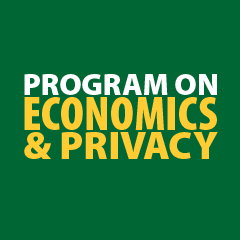The Third Annual Digital Information Policy Scholars Conference will be held on Friday, April 27, 2018 at George Mason University Antonin Scalia Law School in Arlington, Virginia. Registration and breakfast will start at 8:00 am, and the program will begin at 9:00 am. The conference is hosted by the Program on Economics & Privacy whose mission is to promote the sound application of economic analysis to issues surrounding the digital information economy through original research, policy outreach, and education.
The Conference will feature a luncheon keynote from Andrew E. Stivers, Deputy Director for Consumer Protection, Bureau of Economics, Federal Trade Commission.
This conference will feature 12 original research papers, including:
SEC Financial Filings
Ginger Jin (University of Maryland and National Bureau of Economic Research) and Yi Cao (University of Maryland Robert H. Smith School of Business)
Privacy Literacy and Self-Efficacy in Establishing Value of Privacy
Dmitry Epstein and Kelly Quinn (University of Illinois at Chicago)
Sponsored Search Advertisement and Consumer Prices
Eduardo Schnadower Mustri, Alessandro Acquisti (Carnegie Mellon University), and Idris Adjerid (University of Notre Dame)
Infrastructural Solutions to the Analog Keyhole Problem
David Sidi and Laura Brandimarte (The University of Arizona)
Are Digital Markets Different?
John Newman (University of Memphis Cecil C. Humphreys School of Law)
Airbnb, Anonymity, and Illegal Actors
Liad Wagman (IIT Stuart School of Business)
See the full agenda HERE.


 In How Consumers Value Digital Privacy: New Survey Evidence,
In How Consumers Value Digital Privacy: New Survey Evidence,  Program on Economics & Privacy affiliated faculty member, Professor
Program on Economics & Privacy affiliated faculty member, Professor 